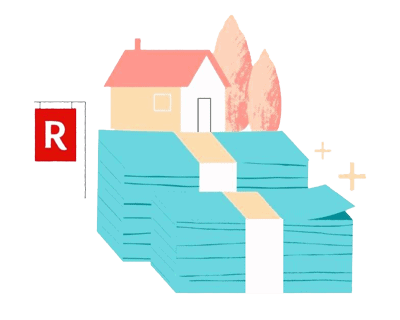Buying a home in Maryland means settling into a state rich in history, waterfront views, and vibrant communities. But before you can dive into all that Maryland has to offer, there’s one last step to consider: closing costs. These expenses, which cover things like transfer taxes, title insurance, and recording fees, can add up quickly. Planning for these costs and avoiding any big purchases until you’ve closed will help ensure a smooth start in your new Maryland home. To help you feel more prepared, this Redfin article will go over how much closing costs are in Maryland, who pays for them, and which costs you can expect to pay as a buyer and as a seller.

How much are closing costs in Maryland, on average?
In addition to the down payment, homebuyers will also need to pay closing costs before securing the keys to their new home. As a general rule of thumb, you can expect closing costs in Maryland to add up between 2%-5% of the purchase price. However, keep in mind that closing cost amounts vary depending on a number of factors – such as the purchase price of the home, the type of loan, and any adjustments negotiated with the seller.
Let’s say you’re buying a home in Baltimore, where the median home sale price is $215,000. Based on this, you could expect closing costs to fall somewhere between $4,300 and $10,750. Whereas if you’re buying a home in Bethesda, which has a much higher median sale price of $1,277,500, closing costs could range from $25,550 and $63,875.
Who pays closing costs in Maryland?
Buyer closing costs in Maryland
- Appraisal fee: If you are financing your home, your mortgage lender will require a home appraisal to ensure the home value is equal to or more than the loan amount. Home appraisals typically cost between $300 and $500, depending on location. If you pay at the time of service, it will not be included in your closing costs.
- Inspection fee: Home inspections generally range from $300 to $500 – they can vary based on local rates and the property’s specific characteristics. If you don’t pay for the inspection at the time of service, this will need to be paid at closing.
- Loan origination fee: Some lenders charge a fee for creating your loan. As you shop around for lenders, inquire about what it covers and whether it’s negotiable to avoid high fees.
- Loan processing fee: In addition to the origination fee, your lender may also charge a fee for processing your loan. This typically covers underwriting and related services. It’s recommended to discuss this fee with your lender to understand what this fee covers and if it can be waived.
- Loan discount points: If you buy discount points to lower your interest rate, you’ll pay a one-time fee at closing. These points can lower your rate by 0.25% to 0.5%, but consider your long-term homeownership plans before paying for a reduced rate.
- Private mortgage insurance (PMI): When your down payment is under 20%, you’re typically required to pay PMI. Some loans allow upfront PMI payment at closing, giving you the choice between higher upfront costs or increased monthly payments.
- Title insurance: Title insurance is a one-time closing cost, with buyers commonly paying for both lender and owner policies.
- Homeowners insurance: Your annual homeowners insurance premium may be included in your closing costs in Maryland.
- Homeowners Association dues: For homes in HOA-managed communities, you might have to pay one month’s dues at closing, which can vary depending on the property and covers maintenance and operational expenses.
- Property taxes: As part of closing costs in Maryland, you may be required to prepay a portion of your property taxes at closing.
Seller closing costs in Maryland
The closing costs covered by sellers in Maryland can vary, but here are a few common closing costs that sellers pay for:
- Real estate agent commission fees: These fees can be a significant cost for sellers. Commission fees may vary and are subject to negotiation. Sellers should discuss their options with their agent.
- Homeowners Association fees: If the property is part of a homeowners association, sellers are usually responsible for settling any outstanding HOA fees or assessments up to the date of closing. Additionally, sellers may need to provide certain HOA documents to the buyer as part of the sale.
- Property taxes: Any outstanding property taxes will be due at this time. However, if the seller has prepaid property taxes for the period that extends beyond the closing date, they may be credited back for the portion they’ve paid but won’t use.
- Title insurance: As part of closing costs for sellers in Maryland, sellers may pay for owner’s title insurance. Typically, this cost is based on the property’s sale price.
- Transfer taxes: Depending on the location and local regulations, sellers in Maryland may be responsible for paying state transfer taxes as well as potential local transfer taxes. Transfer taxes are typically based on the property’s sale price and are collected when ownership of the property is transferred from the seller to the buyer.


























